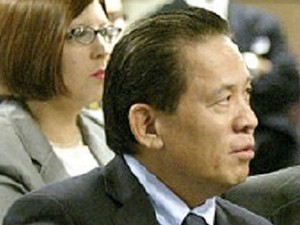MANILA, Philippines—Japanese gaming tycoon Kazuo Okada on Wednesday refuted the findings of a report by a former United States Federal Bureau of Investigation chief accusing the Japanese businessman of violating US antibribery laws.
In a filing before the Nevada Gaming Control Board (NGCB), Okada and his company, Universal Entertainment Corp., said the report produced by former FBI chief Louis Freeh at the behest of Okada’s business rival “lacked merit and [was] generated for an ulterior purpose and motive.”
The Freeh report said that Okada and his firm committed “apparent” violations of the US Foreign Corrupt Practices Act in in pursuit of a license from the Philippine Amusement and Gaming Corp. (Pagcor) for the $2-billion casino resort that Universal is developing in Pagcor’s Entertainment City on Manila Bay.
Universal is one of the four companies putting up casinos in the Pagcor’s Entertainment City. Okada’s casino is due for completion in 2014 but the project could be held up because of allegations of corrupt behavior in the Japanese businessman’s moves to obtain reclaimed land in the Philippines for the project.
The Freeh report also alleged that Okada: had violated Philippine constitutional provisions and statutes that require 60 percent land ownership by Philippine nationals in a joint venture; paid for the expenses of former Pagcor chair Efraim Genuino during the latter’s trip to the 2008 Beijing Olympics; may possibly have made similar payments to a Korean government official; allegedly made admissions regarding the gift-giving; and failed to comply with various requests of Wynn Resorts.
In its report to the NGCB, Universal Entertainment questioned the legitimacy of the Freeh probe, saying it was used mainly as a tool for Okada’s rival, casino magnate Steve Wynn, to redeem and cancel the Japanese businessman’s 24.5 million shares in the Las Vegas-based Wynn Resorts.
Formerly partners and close allies, Okada and Wynn had a public falling out allegedly because Okada—Wynn Resorts’ largest single shareholder—wanted to invest in Pagcor’s Entertainment City, which is being touted as a gaming center to rival Macau where Wynn has a large operation.
In his filing, Okada said that Wynn’s group was forcing his US holding firm, Aruze USA, to relinquish its shares in Wynn Resorts at a $1-billion discount to their actual market value.
On the land ownership issue, Universal Entertainment said that it sought legal advice from local and international law firms on the shareholder structure of the 100-hectare Entertainment City complex and they found nothing questionable about the ownership structure.
In addition to rereviewing compliance with Philippine land ownership laws, Pagcor licensees like Universal also rerevisited the issue of compliance with the Philippines’ Foreign Investment Act of 1991 which limits foreign ownership of certain type of business to 40 percent, Universal told the Nevada regulators.
Universal said that in 2007, Pagcor advised its licensees that “foreign equity restrictions shall be lifted” so that the planned casino business could be 100 percent owned by the licensees and affiliated companies.
The Philippines’ Department of Justice, in a March 2008 written opinion, concurred that companies that would invest or locate in the Pagcor project may not be subjected to foreign equity restrictions, it said.


